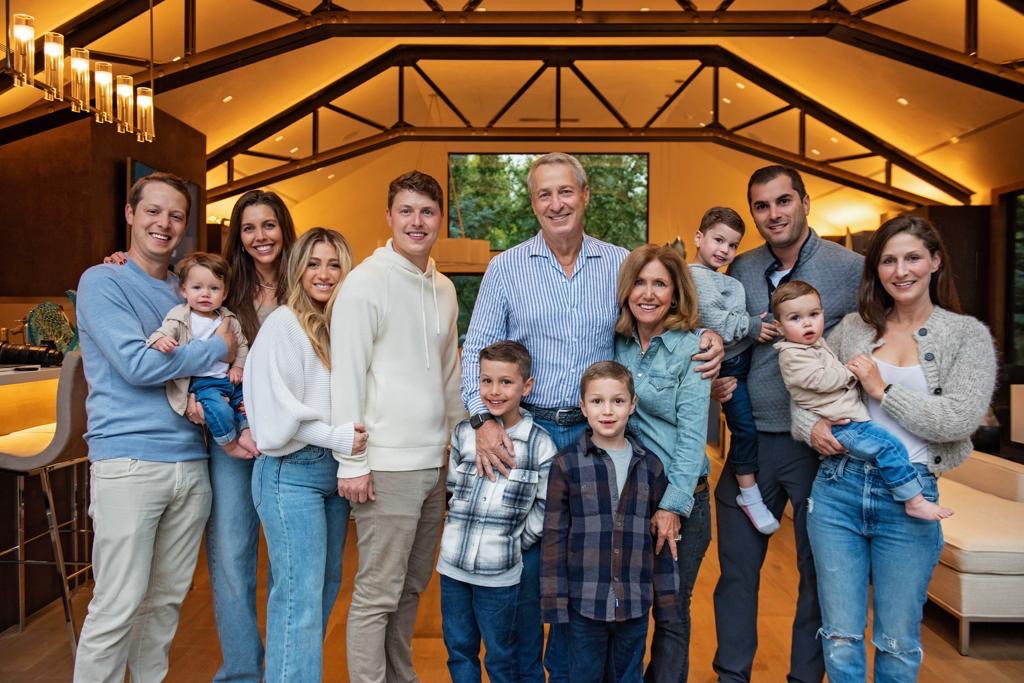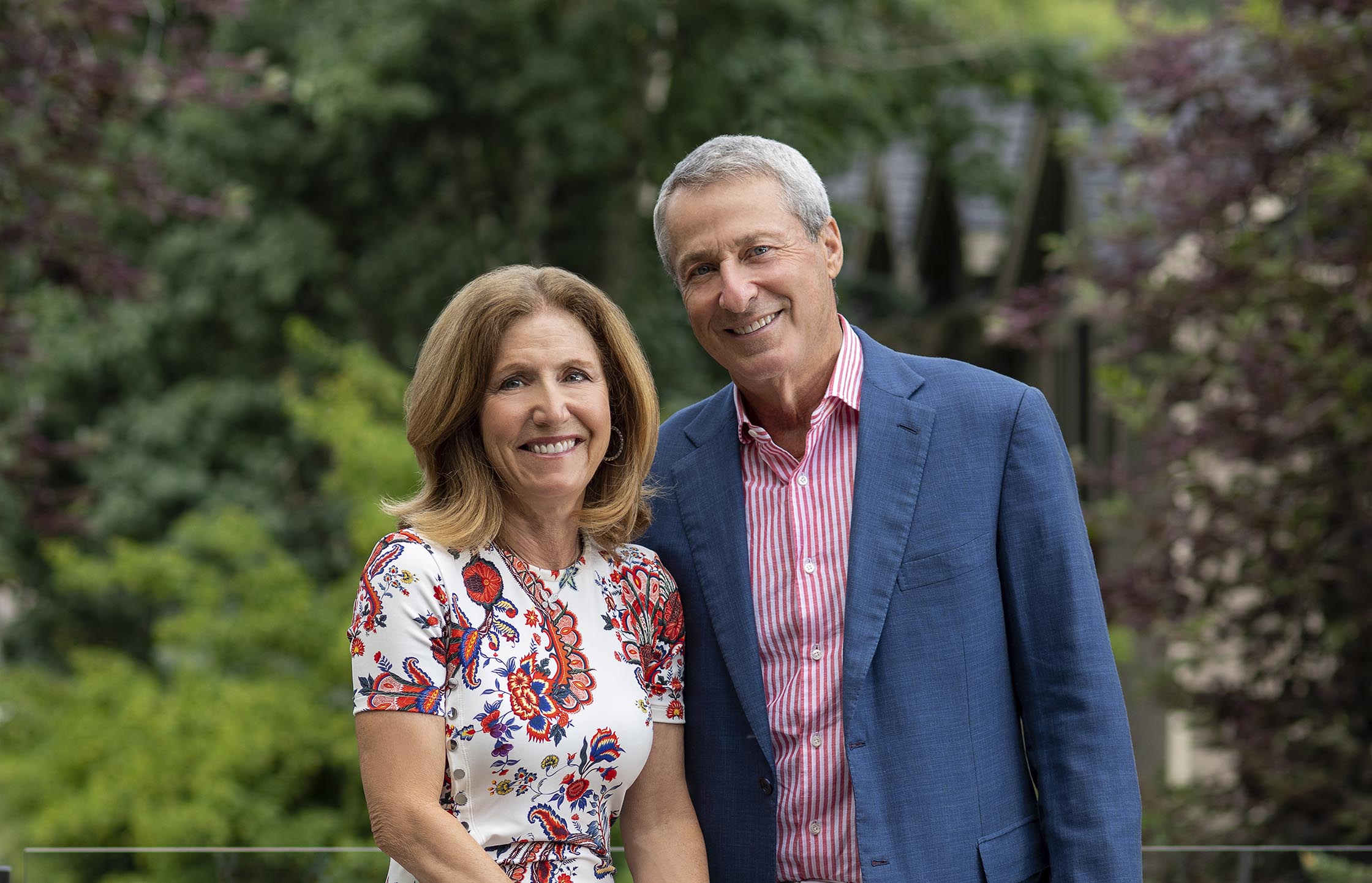Proactive Previvors
A family’s gift establishes the Diamond Hereditary Cancer Prevention Initiative at Sylvester
By Stacey Bomser
Photography by Sean Boggs

From left, Josh Diamond, holding son Leo Diamond, wife Katie Diamond, Ariella Borochoff (fiance of Jacob Diamond), Jon Diamond (grandsons Nadav and Noam Gliksberg in front), Susie Diamond, Gabi Gliksberg (holding Eitan Gliksberg) and Jillian Diamond Gliksberg (holding Eli Diamond).
J
on Diamond believes that knowledge is power and that early detection saves lives. After his uncle died as a result of both pancreatic and breast cancers, Diamond and his family signed up for genetic testing. The results revealed what Diamond feared: He and his three children are BRCA2 positive, putting them at a greater risk of developing breast, ovarian, prostate, pancreatic and skin cancers. The question now was, what could be done to prevent cancer before it occurs?
As previvors, a term used to describe individuals with a hereditary predisposition who don’t yet have cancer, the family made a $5 million gift to Sylvester Comprehensive Cancer Center to establish the Diamond Hereditary Cancer Prevention Initiative. A key component of the initiative is the establishment of the Diamond Protocol, which will focus on prevention, risk reduction, early diagnosis, lifestyle management and research in high-risk populations for hereditary cancers. This includes families of Ashkenazi Jewish descent, like the Diamonds, who have a higher incidence of inheriting a BRCA gene mutation.
“We hope the Diamond Protocol will provide people with an easy channel to be prudent with their health and get on a regular program of preventative actions, such as exercise, nutrition, and diagnostic screenings,” said Diamond, a 66-year-old entrepreneur who lives half the year in South Florida.
Diamond first proposed the protocol concept to his physician, Daniel Sussman, M.D., M.S.P.H. ’02, a Sylvester researcher and professor of clinical medicine at the Miller School, who has an interest in the prevention of colorectal cancer and inherited cancer syndromes of the gastrointestinal tract.
“With the advent of genetic testing and having a family pedigree drawn, we’re able to effectively identify people and families, like the Diamonds, who are at risk but don’t yet have cancer,” Dr. Sussman said. “Their generous gift will bring the care for these patients together in one place and allow their preventive measures to be tracked in an effective manner.”
In addition to calling for a closely monitored screening and surveillance regimen, the Diamond Protocol provides lifestyle modifications, such as access to nutrition counselors, exercise physiologists and psychosocial support to help patients better cope with their identified risk.
“Ultimately, we want to create better outcomes for those who get diagnosed with a genetic predisposition, like Jonny and our children,” Susan Diamond said. “We want our gift to be an impetus to not only identify potential patients but also to create a protocol for people who have a hereditary predisposition or even a future diagnosis of cancer so they can have better outcomes.”
That is a mission the Diamonds’ children all stand behind.
“Growing up, our family instilled a set of values in my siblings and me to always do what we can to help others,” Jacob Diamond said. “The Diamond Hereditary Cancer Prevention Initiative is an example of that value coming to life. We want to make sure all people have access to the right medical guidance and care.”
The Diamonds are confident that Sylvester, which has the distinction of being South Florida’s only NCI-designated cancer center, has the means to make that happen. That is why they have put their faith and philanthropy behind three of its highly renowned physician-researchers, Dr. Sussman, Tracy Crane, Ph.D., and Frank Penedo, Ph.D. ’99, to develop the Diamond Protocol.
“Sylvester has done a phenomenal job of recruiting top talent from around the country to position itself as a leading cancer hospital in the country,” Josh Diamond. said “By having initiatives and resources like this, I believe it will allow them to continue to build upon the momentum they already have created.”
Sylvester Director Stephen D. Nimer, M.D., expressed his gratitude for the Diamonds’ philanthropy and confidence in Sylvester’s physician-scientists.
“Because of the Diamonds, the path ahead becomes more promising, allowing us to amplify the success we’ve already fostered,” said Dr. Nimer, who is also the Oscar de la Renta Endowed Chair in Cancer Research and executive dean of research at the Miller School. “We are grateful to the Diamonds for their trust and generosity. Their gift will help galvanize translational research, leading Sylvester scientists to discover meaningful results that will directly benefit multiple generations within families.”
Understanding the importance of scientific research, the Diamonds have allocated a portion of their gift to create the Diamond Award Endowment Fund. It will be used to support a competitive peer-reviewed grant program that will award internal grants, known as “Diamond Awards,” to Sylvester’s physician-researchers to support translational research in genetic predisposition, genetic testing and lifestyle management for risk reduction.
“Their gift will be a springboard for innovation and care,” Dr. Sussman said. “It will provide Sylvester clinicians and researchers greater access to the tools necessary to achieve success for patients with genetic predispositions to cancers.”
This is promising news for the Diamonds, who are all excited about the prospects their philanthropy will support.
“I believe the Diamond Hereditary Cancer Prevention Initiative will help guide many people with hereditary predispositions and save lives,” Jillian Diamond Gliksberg said. “Even one life saved makes it worthwhile, and that is why we feel this is such an important gift.” ![]()



